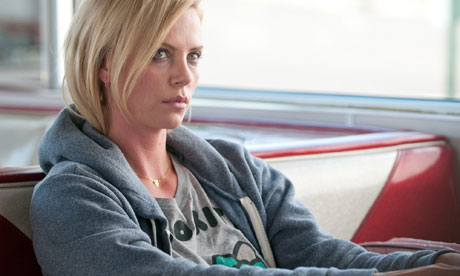
Screenwriter Diablo Cody's first film, Juno, was full of scared teenagers who talked like thirtysomethings; this new one is full of scared thirtysomethings who talk like teenagers. Again, Cody has worked with director Jason Reitman, and again she has created a sharp, funny and watchable black comedy about those people for whom, to quote the old saying, real life is just high school with money.
It features a poignant performance from Charlize Theron as Mavis Gary, a successful but damaged writer of generic fiction for teens: the lucrative "young adult" market. Recently divorced, she lives alone in a smart apartment in Minneapolis, chugging Diet Coke to cure her hangovers, watching daytime TV and writing less and less. Theron shows how Mavis has made a career of imagining herself into the madeup world of high school drama, eavesdropping upon and plagiarising adolescent talk in stores and malls, and neurotically drawing on a rewritten memory of her own teen years of socio-romantic prom-queen triumph. Mavis is a functioning alcoholic, a narcissist and a secret sufferer from trichotillomania, compulsively pulling out strands of hair. But it is specifically her vocation as a writer that is infantilising her and driving her ever so slightly bonkers.
What tips Mavis over the edge is an email from her old high school boyfriend, Buddy (Patrick Wilson), now blissfully married, and still living in their crummy hometown; he attaches an adorable picture of his new baby. Instantly, Mavis is seized by a new project: she will return to this place and destroy Buddy's marriage – because clearly she and Buddy are meant to be together.
Cody and Reitman craft a gathering storm as Mavis's superstar return to this dreary backwater electrifies her variously awestruck and resentful high school contemporaries, including Matt (Patton Oswalt), a disabled guy whose connection with Mavis's history is left cleverly buried. Theron's performance at various stages channels Ellen Page from Juno and Rebecca De Mornay from The Hand That Rocks the Cradle.
Her self-coronation as Homecoming Queen is, of course, a catastrophe, but she at least finds a friend, of sorts. She strikes up an ironic, strategic alliance with Matt, and, as both are aware, he is just the kind of sensitive, fat loser-nerd who wouldn't stand a chance of talking to her when they were in high school. Here Cody satirically alludes to the great and painful theme of high school reunions: how the passage of time has relentlessly dragged women's status down. The ebb tide of female social prestige lowers all boats, even Mavis's.
Lonely Mavis needs someone unthreatening to hang out with, and even manages a kind of blank quasi-compassion when Matt reminds her how he was once known as the "hate crime guy" after being savagely beaten by jocks who erroneously thought he was gay – in the local woodland where Mavis used to go for sex with jocks. Mavis is later reminded by someone that she used to call him "theater fag"; tellingly, she remains vague on this. Cody just lets the implications sink in. (I wonder if she has read Bossypants, the autobiography by 30 Rock's Tina Fey; she recounts how, before she was a professional writer, she was the sort of sensitive, unsexy high-schooler whose boyfriends were stolen by predatory blondes, and she had consolatory friendships with theatre-loving gay guys, who taught her the skills of comedy and irony.)
Theron shows how Mavis's genius for being a high school queen bee now has a tragically pointless late flowering in the company of Buddy's warily polite wife, Beth (Elizabeth Reaser). Mavis is coolly truculent, unimpressed with Beth's work with disabled children who need to be taught how to express emotions, inadvertently revealing that she herself needs precisely this therapy. She claims she cannot see any of Buddy in the baby's face, and even later sweetly hints at worries that the child might have Down's Syndrome – Theron gives full, insidious power to this exquisitely evil remark.
Her desperation is obvious, but in an important way she is still not quite the loser she appears. And this is where Cody delivers the film's real punch. An extra reason for Mavis's grotesque reappearance in her old boyfriend's life is to reinvigorate her career as a writer. Her hometown is horrible; going back there is horrible, and how it all turns out is incredibly horrible. But it cures her writer's block. She starts writing again, converting her experiences into emollient and flattering autobiographical fiction. As her life falls apart, what might delicately be called her art starts snapping back into place.
One of the most refreshing things about Young Adult is Mavis's cleverly unexpected dialogue scene with Matt's homely sister, Sandra (Collette Wolfe), who still worships her. Cody delivers a stinging repudiation of that sentimental piety that is also Hollywood's biggest and most fatuous lie: that home is always best, and monochrome Kansas is better than dazzling, multi-colour Oz. Hollywood was, of course, built by people who couldn't wait to leave home. For all her delusions, Mavis has an icily clear and non-PC grasp of what nonsense this "home's best" line is. She is one of the least sympathetic heroines imaginable, and one of the funniest.

